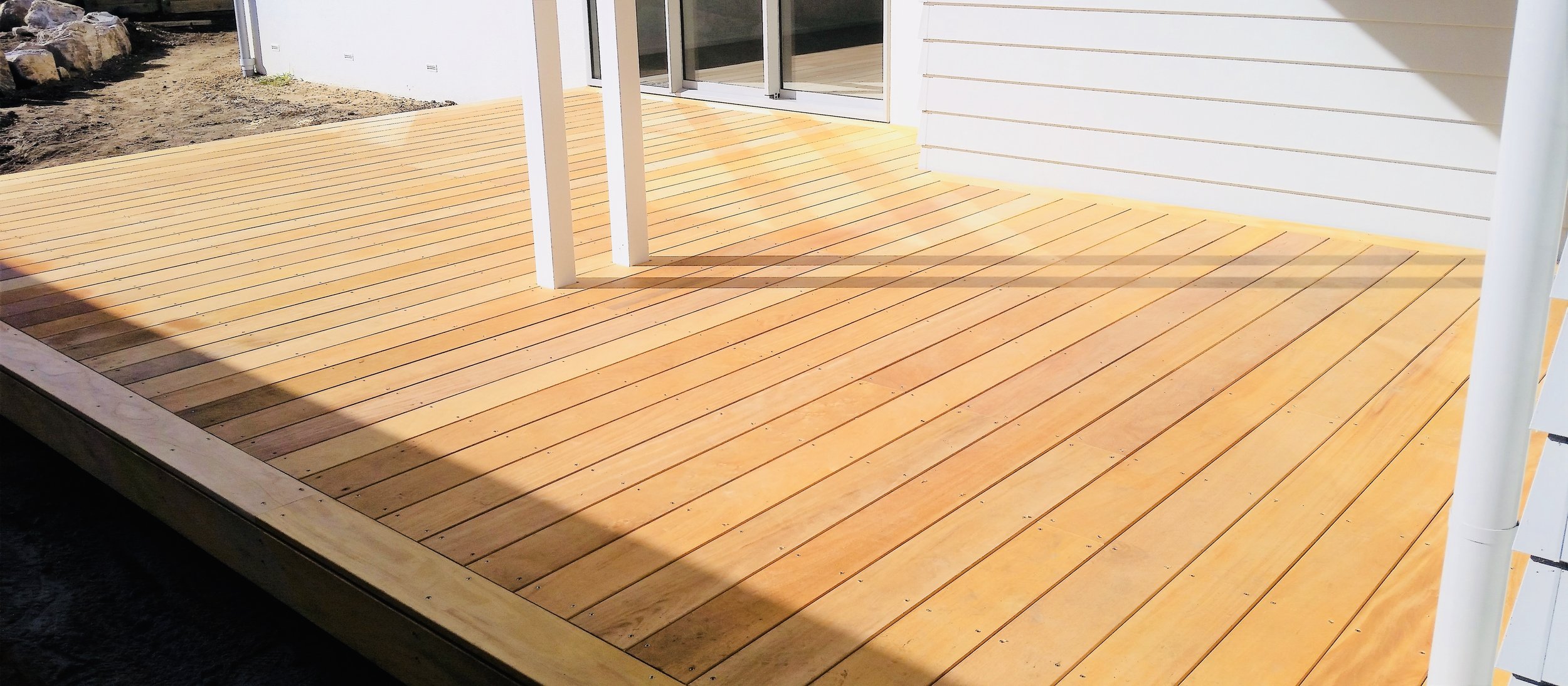
Timber Decking Tauranga
At DeckHQ, we’re a Tauranga-based deck building company, servicing clients in Tauranga, Mount Maunganui, Papamoa, and the wider Bay of Plenty. Whether you're after the natural charm of hardwood, the affordability of pine, or the low-maintenance appeal of composite decking, our deck builders have got you covered.
We supply all decking timber for our deck building projects, offering a range that includes pine decking, composite decking, and premium hardwood options like Kwila, Vitex, Purpleheart, and Garapa.
Choosing the Right Timber for Your Deck
One of the most common questions we get is, “What’s the best timber for my deck?” The answer isn’t one-size-fits-all. It depends on your lifestyle, design goals, maintenance preferences, budget, and the specific needs of your outdoor space.
To help get you started, here’s an overview of the most popular decking timber types used in the Bay of Plenty and across New Zealand:
Hardwood Decking Tauranga
• Durability: Hardwood is extremely strong, dense, and built to last. Most hardwood decks will comfortably last 25 years or more when properly maintained.
• Aesthetic Appeal: Hardwood decking has a rich, natural look that enhances any outdoor space. With regular cleaning and oiling, it stays looking fresh and vibrant.
• Suitability: Not all hardwoods are the same. Some are denser and better suited to high-traffic areas, including commercial applications, while others are ideal for residential decks.
Popular Hardwood Decking Options:
• Kwila: Renowned for its deep reddish-brown tone and durability.
• Vitex: A lighter-coloured hardwood, popular for its smooth finish and sustainable sourcing.
• Purpleheart: Striking in appearance with a rich purple hue that ages beautifully over time.
• Garapa: A golden-hued hardwood offering excellent durability and resistance to wear.
If you're unsure which timber best fits your needs, contact the team at DeckHQ Tauranga. We're happy to offer advice and guide you through the pros and cons based on your project requirements and budget.
Vitex is a pale-yellow to creamy-grey timber that fades to grey if left to weather. It’s sourced from low impact village-based operations in the Solomon Islands.
Garapa is sourced from South America and has a warm, honey-coloured tone which will fade to driftwood grey if left to weather.
Kwila, grown in Indonesia and Malaysia, will maintain its rich reddish tones if kept oiled, otherwise it will silver off. Kwila can be prone to leaching.
Purpleheart starts off a rich purple colour which rapidly turns brown then silvers off with time. Purpleheart is one of the strongest timbers in the world.
All of these hardwoods are very dense and require pre-drilling both the mounting hole and the countersink hole. Fixing a hardwood deck down with two stainless screws per joist is the only system we would consider.
Give us a call on 0800 332 547 and we can help you decide if hardwood is a good option for you.
Pine Decking (Softwood)
Pine is a softwood, and is New Zealand’s most commonly used decking and fencing timber.
Pine is the most budget-friendly option for deck building. It’s easy to work with and suits a variety of fixing methods. Pine is produced here in New Zealand, where it can go from a seedling to a tree ready for harvest in just 25 years. Combined with its lower transport footprint this makes it arguably a more sustainable choice.
Because of its lower density, pine generally doesn’t have the life expectancy of hardwoods or composites. It can be susceptible to being marked in high traffic areas. Even kiln dried pine will swell up in the wet winter months and shrink in a hot, dry summer and this will sometimes result in uneven gaps appearing and then closing up again.
To discover whether pine might suit your particular build requirements visit our Contact page or call us on 0800 332 547.
Composite Decking
There are many types of Composite decking on the market, made up of different combinations of components. Typically they contain recycled plastic and recycled timber. In some cases the recycled material will be wood flour, rice husk or peanut hulls. While manufacturers often claim to use recycled plastic this is not always the case. Keep in mind too, that unlike timber, a composite deck is unlikely to be biodegradable at the end of its life and any construction waste will be similarly non-degradable.
Composite decks are very durable, weather resistant, and offer the maintenance-free factor that many people require. They are splinter proof and can be great in commercial applications, high traffic requirements and around pool areas.
It’s important to use the right Composite product and to check the warranty offered – we can talk you through the options.

“Trent was awesome to work with, his workmanship is outstanding and his dedication to the customer is invaluable, the decking looks awesome, thanks Trent it was great to work with you.”
Hendry, September 2022






